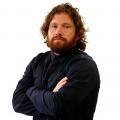As the threat to services at the South West Acute Hospital (SWAH) continue, a Fermanagh man has spoken about his experiences of the hospital – and he is adamant that if were not for the care he received there, his life could have been a lot different.
In February, 2017, at the age of 48, John McDonnell was doing a workout before work as he prepared for the Manchester Marathon. But, as he explains, his life was turned on its head in the early hours of that morning.
“About 6am, I was up in the attic just doing some weights before work, training for the Manchester Marathon.
“I didn’t have any idea there was anything wrong. I just kept falling down; I kept dropping things, and then I just put my head down and I said, ‘I must be tired’.
“None of this was clicking [with me]; it didn’t click that there was anything wrong.
“So I put my head down, and it must have been about 20 minutes later I kind of woke up again. I tried to get down the ladder, and I couldn’t really walk.”
After eventually alerting his family to what was happening, John was helped down the ladder by his son before his wife, Roisin, rang for an ambulance. Because of the rural nature of their house in Cooneen, John’s wife met the ambulance in Maguiresbridge, and he was taken to the hospital for tests.
“As I was sitting waiting outside the lab, parked up in a wheelchair in the hospital, and there was nobody near me, I had ‘the big one’ [a stroke] and I couldn’t talk.
“I lost everything on the left side; I was trying to get words out, but couldn’t, and was making godawful noises.”
The doctors were in no doubt it was a stroke, and all caused by an 11mm hole in his heart – a defect he had since birth, but was unaware of until then.
After being given thrombolysis, John improved and was able to walk and talk again, but he spent the next eight days in the Stroke Unit at the SWAH.
Professor Jim Kelly, a consultant at the Stroke Unit, showed John how a second blood clot went into his brain and split into five, affecting five different areas of his brain.
But thanks to help from everyone at the SWAH John, who is a keen runner, has been in great shape since. And he knows it was down to the quality services at the hospital that saved his life.
“Since then, I have had my heart repaired, and to be honest I am running better than I ever did.
“I broke three hours in the marathon this year for the first time ever, and things have been on an upward trajectory since then.
‘Down to where that hospital is’
“But no doubt in my mind, it’s down to where that hospital is, and the quality of my life, and the quality of my wife and fours kids’ lives, and all my friends and family – it’s all down to the fact that we have that [hospital and its services] there.
“Imagine getting an ambulance out to my house, then out to Derry or Craigavon, or somewhere that’s not worth thinking about.
“I can’t even imagine what physically I’d have been like now, if I didn’t get to the SWAH. They had the best of the best there, between the three specialists that took care of me.”
Along with Professor Kelly, John paid tribute to cardiologist Dr. Monica Monaghan, and clinical psychologist Dr. Shelley McKeown, and also to all the staff he encountered in the hospital.
“I had a place to go right there, and they took me in and knew my history. I can’t even start to tell you how incredibly good it was, the service.
“I would have to say, without question, the quality of my life is down to the location of the services that were available,” John concluded.
To read more about John’s story and his experiences at the SWAH, see his book, ‘A Heart for Running – How Running Saved My Life’, which will be available from Amazon from December 5.







Comments: Our rules
We want our comments to be a lively and valuable part of our community - a place where readers can debate and engage with the most important local issues. The ability to comment on our stories is a privilege, not a right, however, and that privilege may be withdrawn if it is abused or misused.
Please report any comments that break our rules.
Read the rules here